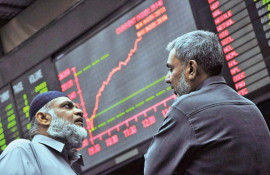
After recording a significant spike during lockdown, the trend of online shopping has started declining gradually as Pakistani buyers are returning to shopping at physical stores. However, digital platforms have voiced hope that with time, the buyers will return to online shops.
At a media briefing on Tuesday, Daraz Pakistan Chief Marketing Officer Ammar Hassan highlighted that conversion rate of the platform registered a 25% hike during lockdown.
Conversion rate is the difference between the number of people who visit a website per day and those who make a purchase. The nationwide lockdown imposed in late March was a very difficult time for businesses but it proved to be beneficial for the company because sales of dFresh segment increased ninefold, said Hassan.
dFresh is the department that deals with the sale of fresh produce such as fruits and vegetables. “Around 800,000 people visited the e-commerce website but not all of them made purchases,” explained Daraz Pakistan Managing Director Ehsan Saya. “The number of people who made purchases from the platform increased 25% during lockdown due to the pandemic and subsequent closure of markets.”
That trend of online shopping gathered pace after the lockdown was imposed, he said. At its annual event, ie 11/11, the platform expects 2.5 million visitors in 2020 compared to 1.8 million in 2019. The conversion rate was better now than it was before Covid-19, he said, adding that the company’s October targets had already been met.
Saya added that after the spread of Covid-19, demand for products grew on the website but limited capacity for enhanced operation and hurdles emerging from the lockdown compromised the service. Initially, the Sindh government decided to shut all markets including e-commerce platforms and the company had to explain that continuation of e-commerce activities would mitigate the impact of lockdown, hence, they should be allowed to operate, he pointed out.
During the lockdown, 50,000 new sellers were registered on the platform from 88 cities of Pakistan, said Saya. In the past three years, the platform created 60,000 to 80,000 jobs.
The platform has introduced a new service for the sellers, which provides them the facility of storage and dispatching their merchandise given that the sellers can provide products in bulk to Daraz. He added that 25% of the sellers were currently utilising the facility while the company targeted to inflate the number to 40%.
The company also introduced Dexport, a platform for exporters to connect with Alibaba. So far, 80 exporters have signed up and the company has entered into talks with the Ministry of Commerce and Trade Development Authority of Pakistan for subsidy because it has a fee of around $2,000 for registration.
“Pakistani exporters ship products to the US and Europe; China is in the neighborhood, hence, our exporters should gain access to this market,” said Saya.
Published in The Express Tribune, October 21st, 2020.
Like Business on Facebook, follow @TribuneBiz on Twitter to stay informed and join in the conversation.


1725877703-0/Tribune-Pic-(5)1725877703-0-165x106.webp)















COMMENTS
Comments are moderated and generally will be posted if they are on-topic and not abusive.
For more information, please see our Comments FAQ